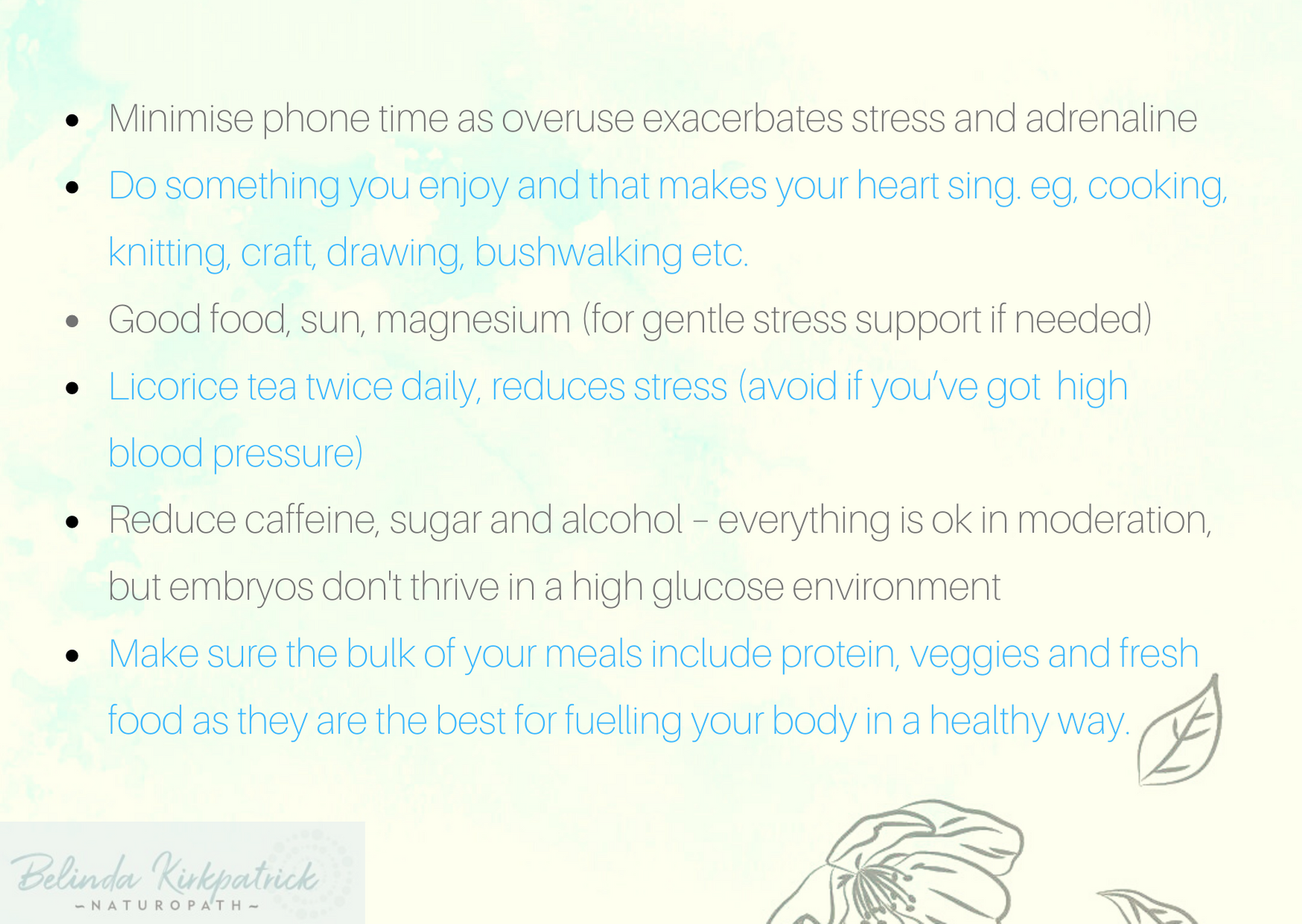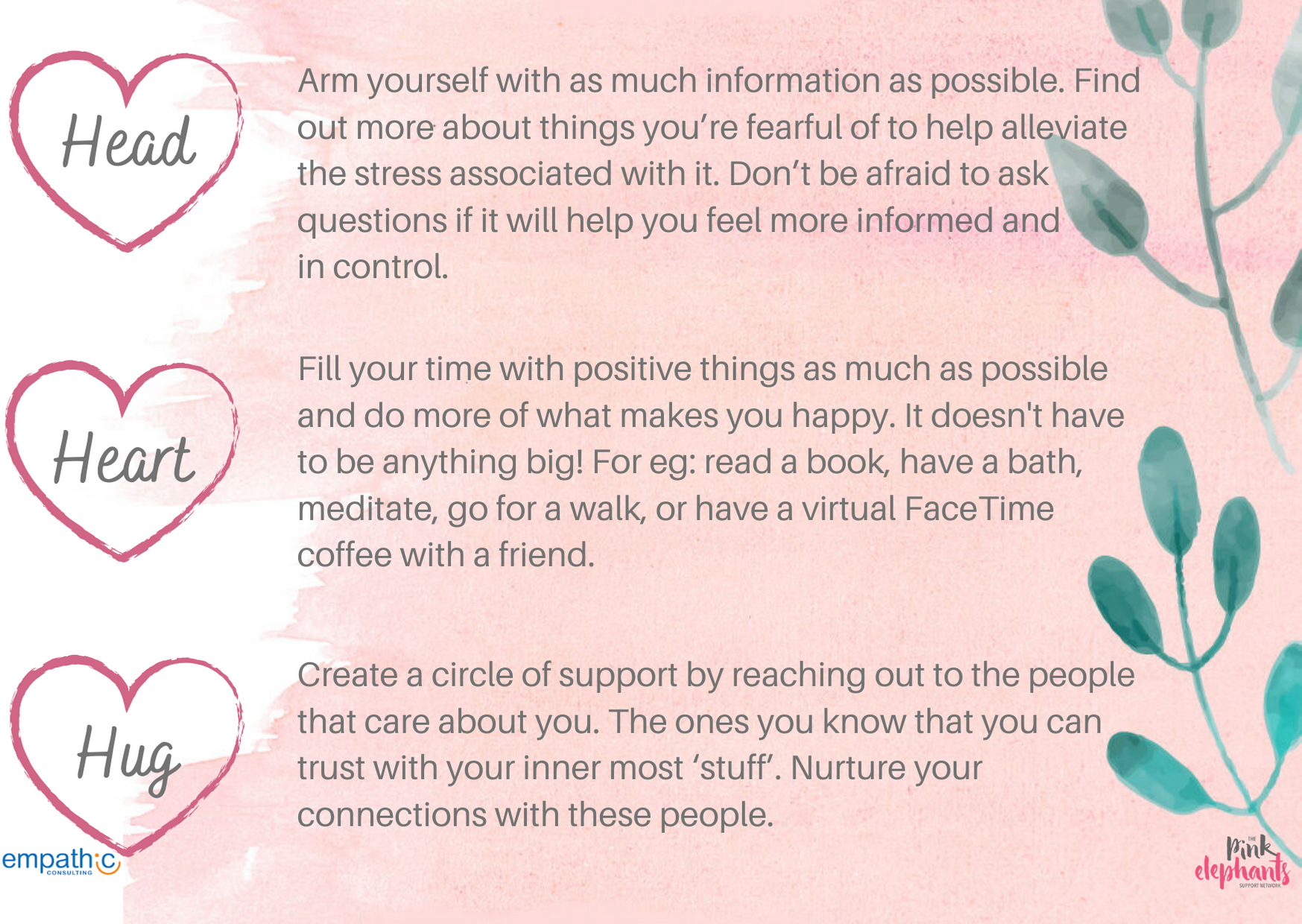
During this panel we focussed on general fertility issues and important things to remember when trying to conceive, while also addressing common concerns in terms of the situation we find ourselves in with Covid-19.
Our expert panel consisted of Genea Fertility Specialist Dr Anthony Marren, Naturopath & Nutritionist Belinda Kirkpatrick, Fertility & Empathy Coach Miranda Murray, and was hosted by Genea Corporate Communications Manager Elizabeth Gosch.
We began with a discussion around the added stress and anxiety that many couples are feeling, trying to conceive during a global pandemic.
What are some of the ways that women and couples can try to reduce stress when trying to conceive? (Belinda)
The key to managing stress not only during a pandemic but in general is to build stress management techniques into your daily routine. For example, try to incorporate some meditation, gentle exercise or deep breathing into your day.
Keeping balance in the body is really important, especially as our routines have changed for many of us due to working from home and sitting around a lot more. However, in general, here are some suggestions to reducing stress long term:

If someone is trying to conceive, what supplements should they consider taking? (Belinda)

Remember to start taking supplements for at least three months prior to trying to conceive. That’s how long it takes for eggs (and sperm) to go through their maturation process.
Belinda recommends:
⇒ Taking 25-50mg of zinc depending on whether your levels are actually low.
⇒ MyGen Health Fertility Multi, as it has 25mg of zinc
⇒ 5mg of folate if you’ve had a previous neural tube defect in pregnancy
⇒ 5mg of folate taken as Methylfolate if you have MTHFR gene (inability to absorb folate)
⇒ Drink filtered water if possible, preferably via a filter on your tap rather than a plastic bottle
What can men do to try improve their sperm quality? (Belinda)
♥ Regular (twice weekly) ejaculation away from the fertile window is good for sperm quality. This keeps sperm fresh and DNA fragmentation as low as possible.
♥ Eat a nutrient dense diet high in protein and veggies. Aim for 4-5 cups of veggies a day.
♥ Avoid alcohol as it negatively impacts sperm.
♥ Don’t wear very tight pants/underwear.
♥ Increase intake of pumpkin seeds for Zinc, brazil nuts for Selenium, beetroot for nitric oxide which helps with blood vessel dilation, and leafy greens especially spinach.
♥ Drink lots of water – at least 30ml/kg of body weight.
Is it safe to be trying to conceive now while we’re in the midst of a pandemic? (Dr Marren)
Falling pregnant in and of itself is not an issue as there is not believed to be a risk to the baby. However perhaps consider that if we do get a second wave of Covid-19, accessing prenatal care might be stressful with restrictions and your pregnancy experience may not be as positive as you would have hoped.
Most fertility clinics including Genea have reopened for fertility treatments, but are still complying with screening and social distancing procedures, by staggering appointments and requesting that partners do not attend unless absolutely necessary.
If people have decided to put TTC on hold until things settle down, what advice do you have for them? (Dr Marren)
If you don’t want to achieve a pregnancy at this time, then don’t have intercourse in the fertile period or consider some contraception. If you don’t mind either way, then continue your preconception care as normal. Get plenty of rest, moderate exercise, eat a healthy diet and take your pre-pregnancy supplements.
Given that for many people their alcohol consumption has increased during lockdown, then be mindful that you should try to cut down or abstain if there is a chance you could conceive.
It’s been said that the feelings that many people have been feeling during the pandemic and lock down are not dissimilar to those which women feel during fertility treatment. Do you think this has given people who have been struggling to conceive the ability to cope better with this situation, or has it exacerbated their stress and anxiety? (Miranda)
It’s done both. Certainly when the pandemic kicked off, there were a lot of familiar feelings that came up around a lack of certainty, lack of control, fear of the unknown and an inability to plan too far ahead. For people going through fertility challenges and TTC, this is something that’s experienced a lot. However now we have the added stress of cancelled cycles, increased fear of health in general, and also needing reassurance that if they do need to go into their fertility clinic, they will be safe.
On the flip side, people experiencing fertility challenges have an immense amount of strength and resilience already, so from that point of view, you’d already have tools in your mental health toolkit to help you.
Are there other strategies that people who are experiencing miscarriage and infertility during this time can employ? (Miranda)
Three tools that are easy to remember and extremely effective are Head, Heart and Hug.

Be kind to yourself. This is not a normal time for anyone, and even when you’re going through fertility issues, remember to be kind to yourself. You don’t have to have it all sorted out all the time.
People have become more competitive during lockdown – eg making sourdough from scratch, learning a language – projects that can seem insurmountable when you’re already under stress from fertility issues/miscarriage. How can people protect themselves from these outside influences? (Miranda)
Firstly, put down social media! If that’s what causing you the grief or drawing you into the comparison game, then get off social media for a while. Spend this time looking out for yourself and putting yourself first. When you’re going through fertility issues, you’ve got enough on your plate. You don’t have to try to excel at things!
Next, nourish yourself – before you pick up your phone in the morning, do one thing that is good for you. It might be making a lemon water, doing meditation, yoga, sitting out in the sun, a short walk, etc. Alternatively, have a nice bath when the rest of the house has gone to bed.
Lastly, give yourself permission to actually feel and express emotions. A good way to do that is to try some journaling, speak to a girlfriend or even a therapist. We’re so quick to judge ourselves as being too emotional, but remember that our feelings don’t define who we are as a person. They’re just feelings. Let them happen and move through them.
Dr Marren then answered some questions from our online audience:
What is your feeling on donor eggs considering the current restrictions on overseas travel?
There are several options to obtain donor eggs locally, either via a known donor or clinic recruited donors. More and more people are turning to social media through organisations such as Egg Donors Australia and Egg Angels. The World Egg Bank is also an option.
Are there any studies on the benefits of laparoscopy for superficial endometriosis, and whether it actually improves IVF outcomes /embryo transfer success rates?
Endometriosis is where the lining of the womb is present outside of the uterus. If endometriosis is really bad it can damage the fallopian tubes and cause the ovaries to become stuck. It also impacts the lining of the womb. It’s an inflammatory process that affects egg quality and halves the rate of spontaneous conception.
Given that endometriosis affects egg quality, there tends to be better outcomes for women using donor eggs. It is questionable whether implantation itself is affected, but certainly if good embryos are repeatedly failing in a woman with endometriosis, then a laparoscopy should be considered.
In terms of unexplained infertility, if you do an IVF cycle you have an opportunity to look at embryo quality. Quality up to Day 3 is reflective of eggs, whereas quality from Days 3-5 is when sperm quality starts to play a role. If you can see that embryo quality around Day 3 is an issue, doing a laparoscopy to check for endometriosis could be worthwhile.
What can you do to thicken your uterine lining?
Normal lining can be anywhere from 6mm-14mm. Outside those parameters, pregnancy rates from embryo transfer seem to drop. In some cases women who’ve had terminations or curettes, can present with damaged uterine lining which effects the its ability to shed properly and then regenerate and thicken.
Oestrogen thickens the lining, so in an IVF setting you can do a stimulated cycle, or a hormone replacement cycle using high levels of oestrogen (either orally, vaginally or patch). If that doesn’t work, then we look at low dose aspirin or vitamin E to try to increase blood flow to the uterus.
Belinda – Vitamin E, dose of fish oil. Anything that stimulates nitric oxide production, leafy greens etc. This is only effective for people who don’t have a damaged lining.
What is your feeling on progesterone treatment for recurrent miscarriage?
Progesterone support in women who have had 3 or more miscarriages has been seen to halve the rate of miscarriages. It’s fairly non-invasive and relatively low risk, however are messy and expensive for what they are. The dose is generally 200mg vaginally, twice a day.
How do you treat Natural Killer Cells?
These are normal immune cells that are found in the blood and in the uterus. There is some debate as to whether elevated levels of these NKCells can cause implantation issues or miscarriage.
Prednisone and Clexane together is the current treatment for NKCells. Clexane is relatively harmless but using Prednisone presents a three-fold risk of a cleft palette in the baby. If you are going to embark on this treatment, there needs to be a frank discussion about the risks involved.
Can multiple D&C’s affect implantation in future pregnancies?
There is no clear evidence on whether there is a cumulative damage of D&Cs or not, however there should be a good clinical indication for performing one. If it is deemed necessary, the woman/couple needs to be counselled and the risks explained. More often these days curettes are being done under ultrasound guidance so it can be easily seen when the miscarriage/tissue is gone, rather than scraping too much and potentially causing damage.
Can antidepressants effect fertility in men and women?
Antidepressants are fairly safe in a pregnancy and conception setting so shouldn’t be stopped. Pregnancy can be very stressful, and to stop an antidepressant at this time could cause more problems like increased anxiety and increased blood pressure. It is recommended to stay on them during breastfeeding as well as it can be a stressful time for new parents.
Mothersafe is a fantastic resource in terms of medications so please call them if you have any questions. Ph: 1800 647848.
How many eggs you would expect to get in an IVF cycle using Gonal F with an AMH of 8?
This is difficult to answer, but the rough rule of thumb is that if your AMH is 8, then you might get around 8 eggs. A normal number of follicles per ovary is between 5 and 12. In a normal month one would ovulate and the rest will die off. In an IVF cycle they’re the follicles that we’re encouraging to grow and we can normally get about ½ to 2/3 to grow.
It’s important to note that from one month to another there is a significant cycle variation and most women will experience a 3 or more egg difference.

We would like to extend a huge thanks to our fantastic panellists and host:
 Dr Anthony Marren (B. Med (Hons.), M. Med (R. H. H. G.), FRANZCOG, CREI): Fertility specialist at Genea and Research Lead for Academic Gynaecology at Royal Prince Alfred Hospital
Dr Anthony Marren (B. Med (Hons.), M. Med (R. H. H. G.), FRANZCOG, CREI): Fertility specialist at Genea and Research Lead for Academic Gynaecology at Royal Prince Alfred Hospital
https://www.genea.com.au/specialists/dr-anthony-marren

Belinda Kirkpatrick: Naturopath and Nutritionist who specialises in natural fertility, family, and women’s health care. www.belindakirkpatrick.com.au. Insta: @bknaturopathy
Healthy Hormones with Belinda Kirkpatrick FB group

Miranda Murray: Fertility Coach and co-founder of Empathetic Consulting. Miranda is an Ambassador for charities and regularly supports women in challenges regarding infertility and other challenges both in and out of the workplace.
www.empathicconsulting.com

Liz Gosch: Corporate Communications Manager at Genea